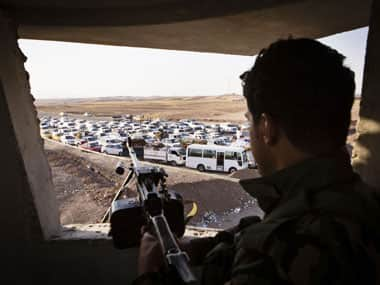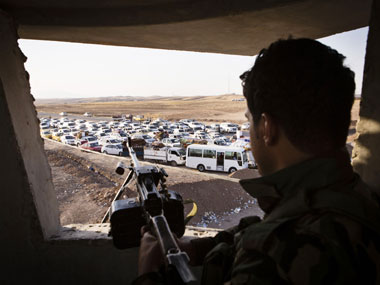The Ministry of Home affairs today said that the India was aware of the whereabouts of its 40 citizens who were said to be abducted in Iraq. Even as the government struggled to establish talks with leaders holding the Indians in the war torn country, External Affairs Minister Sushma Swaraj said, “We are in contact with every organisation possible to help us in our efforts to rescue Indians in Iraq. However, patience is essential. Not only are we doing what the government has to do but more. We are leaving no stone unturned to help them,” ANI quoted Swaraj as saying." [caption id=“attachment_1579331” align=“alignleft” width=“380”]  Representational image. Reuters[/caption] “The situation in Iraq doesn’t allow other Indians to come back to India, but when the situation is neutral the Government of India will take care of it,” she said. Former National Security Advisor Leela Ponappa said during a television panel discussion on CNN-IBN, “I think it is a complex situation, the government is dealing with it on a step by step basis on the information available. They are trying to share as much information as is prudent.” “The first stage is to get as much information as you can. Where are the 40? How much is being demanded by the militants? The Red Cross and the Red Crescent are very important sources of information. The government has to look at what steps can be taken. There would be hard decisions to be taken,” she said. With reports of companies such as Siemens having evacuated some German citizens as soon as the war broke out, has India been a tad too slow? Ponappa said, “Time is always of the essence. The sooner things happen the better. Timeliness of everything is critical. But it is also critical that one needs to be patient and discreet. " BJP spokesperson MJ Akbar said, “Recognition of the crisis institutionally took a while. We didn’t know the workers in Iraq were working for a private company. In any case it is the duty of government to ensure their safety.” However Akbar said the government was doing all it can. “Both the Prime Minister and Foreign Minister are doing their absolute utmost to face the primary responsibility to secure the well-being of Indian citizens. There is no one who can do more than that.” “We must remember that this is an incident that is out of the fog of war. This is not a conventional war. This is a fight of militias with their own rules. Their enemy is not India, but the forces of stability in their country. This particular militia is a militia present in many parts of the world and is theocratic,” Akbar said. India’s problems are not limited to getting access to its citizens. Some workers in Iraq are themselves refusing to come back for want of financial backing. Besides, many have not been paid their salaries. Usha Krishna Kumar, president of an organisation that helps Indians abroad, said, “They have paid the recruitment agency, plus they haven’t got their salaries. Also they have no choice because they are stuck in the hospital where the ISIS is present and they may be caught in the crossfire.” Often many workers from India travel to foreign countries and not register themselves. Is this a lesson for India to keep track of such people? Ponappa said, “One of the pages very clearly advises them to register themselves near the Indian embassy. In a crisis situation, very often they come in through different channels and they don’t register themselves." Given the complicated situation that India faces in Iran, the government is expected to take a multi-pronged approach to settle issues. Retired Commodore GJ Singh said, “We have to understand what is the overall position in Iraq. The north is captured by ISIS and it is going southwards, then we have Kurds in the northeast, in the south we have Nouri al-Maliki’s government. At this point the position is not very clear as to how and where to go.” “We have to bring the Indian workers to a point where they can be evacuated. The safest will be to bring them to Baghdad, but how to do that? al-Maliki’s government can do nothing. We can’t negotiate with the ISIS. The only option is the Baghdad government. Unfortunately they are totally demoralised,” he said. While keeping in touch with humanitarian organisations may help, India also needs to be in touch with those who have some holds in Iraq. Ponappa said, “I have no doubt that they are communicating with anyone who can either help or throw light on the situation. Iran can help. But the variables are so many you cannot have standard operating procedure. You have to seize the moment as the opportunity comes.”
Even as the government struggled to establish talks with sources in the war torn country, External Affairs Minister Sushma Swaraj said, “We are in contact with every organisation possible to help us in our efforts to rescue Indians in Iraq. However, patience is essential. Not only are we doing what the government has to do but more. We are leaving no stone unturned to help them,” ANI quoted Swaraj as saying."
Advertisement
End of Article


)

)
)
)
)
)
)
)
)



